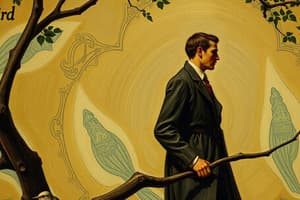Podcast
Questions and Answers
What does Atticus reveal about his character through the quote, 'Atticus don't ever do anything to Jem and me in the house that he wouldn't do in the yard.'?
What does Atticus reveal about his character through the quote, 'Atticus don't ever do anything to Jem and me in the house that he wouldn't do in the yard.'?
- He treats his children with respect. (correct)
- He is informal and relaxed.
- He acts differently at home and in public.
- He is strict and authoritative.
What concept does the quote, 'I can't live one way in town and another way in my home,' represent?
What concept does the quote, 'I can't live one way in town and another way in my home,' represent?
Honesty and equality.
The quote, 'Shoot all the bluejays you want, if you can hit 'em, but remember it's a sin to kill a mockingbird,' indicates that mockingbirds are harmful creatures.
The quote, 'Shoot all the bluejays you want, if you can hit 'em, but remember it's a sin to kill a mockingbird,' indicates that mockingbirds are harmful creatures.
False (B)
What does Atticus believe about Tom Robinson in the quote, 'Scout, I couldn't go to church and worship God if I didn't try to help that man,'?
What does Atticus believe about Tom Robinson in the quote, 'Scout, I couldn't go to church and worship God if I didn't try to help that man,'?
What does the choice of calling Atticus 'Atticus' and not 'Dad' highlight?
What does the choice of calling Atticus 'Atticus' and not 'Dad' highlight?
Atticus assumes the ______ in people until shown otherwise, such as with Boo, when he says, 'Most people are, Scout, when you finally see them.'
Atticus assumes the ______ in people until shown otherwise, such as with Boo, when he says, 'Most people are, Scout, when you finally see them.'
What theme does 'To Kill a Mockingbird' primarily explore through Atticus Finch?
What theme does 'To Kill a Mockingbird' primarily explore through Atticus Finch?
How does Harper Lee portray Atticus Finch in the conclusion of 'To Kill a Mockingbird'?
How does Harper Lee portray Atticus Finch in the conclusion of 'To Kill a Mockingbird'?
Flashcards are hidden until you start studying
Study Notes
Atticus Finch's Character Analysis
- Atticus maintains consistency in behavior, treating his children and others with the same respect, reflecting his authenticity.
- His belief in equity is demonstrated through his refusal to live differently in public versus private, reinforcing his integrity.
- The metaphor of mockingbirds symbolizes the innocent individuals in society who deserve protection rather than oppression, highlighting racial injustices present in the narrative.
- His commitment to justice is evident in his defense of Tom Robinson, driven by moral obligation rather than societal pressures, showcasing Atticus's principles.
- The choice to be addressed as "Atticus" rather than "Dad" signifies mutual respect between him and his children, reinforcing the idea of equality in relationships.
- Atticus's optimistic perception of human nature is revealed in his belief that most people are fundamentally good, countering societal prejudices and assumptions.
- The novel is set against the backdrop of a racially charged trial in 1930s Alabama, with Atticus representing moral courage as he defends a black man against false accusations.
- Overall, Atticus Finch embodies heroism and integrity, characterized through literary devices that evoke reader empathy and admiration.
Studying That Suits You
Use AI to generate personalized quizzes and flashcards to suit your learning preferences.




